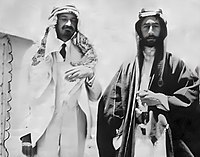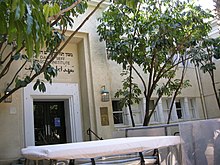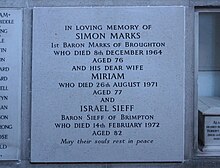Israel Sieff, Baron Sieff
Israel Moses Sieff, Baron Sieff FRGS (born May 4, 1889 in Manchester , † February 14, 1972 in London ) was a British businessman and politician .
Between 1964 and 1967 he was chairman of the board of directors of the retail company Marks & Spencer and from 1966 he was a life peer member of the House of Lords .
Life
Family, Studies, and Supporters of Zionism

Sieff, son of the Manchester-based Jewish businessman Ephraim Sieff, who immigrated to Great Britain from Lithuania , completed a degree in economics at the University of Manchester after attending the Grammar School in Manchester , which he obtained with a Bachelor of Commerce (B.Com.) completed. On June 15, 1910, he married Rebecca Marks , whose father Michael Marks had founded the retail company Marks & Spencer together with Thomas Spencer in 1894 .
In 1913, together with Simon Marks , who was married to his older sister Miriam Sieff, and Harry Sacher , another brother-in-law, he met the later first President of Israel Chaim Weizmann , who at the time was a professor at the University of Manchester. From that time on, the brothers-in-law Marks, Sacher and Sieff were close friends and allies of Chaim Weizmann and supported his Zionist ideas. As such, they helped advance the first Balfour Declaration , in which Great Britain agreed on November 2, 1917, to use the Zionist endeavors to establish a "national home" for the Jewish people in Palestine . The collaboration also resulted in Manchester becoming the Zionist center of Great Britain.
Sieff was also a co-founder and article writer for the biweekly Palestine magazine , which helped create public opinion in favor of Zionism in the United Kingdom. When Weizmann traveled to Palestine in 1918 as head of the Zionist Commission in order to lay the foundations for implementing the Balfour Declaration, Sieff traveled as its secretary. At this time, the wives, Rebecca Sieff and Vera Weizmann , were also involved in the Zionist movement and in 1920 were among the co-founders of the Women's International Zionist Organization (WIZO).
Marks & Spencer, PEP and House of Lords

Sieff, who had been a member of the board of directors of Marks & Spencer since 1915, later supported his brother-in-law Simon Marks in the management of Marks & Spencer after the company had relocated its headquarters to London and played a key role in this period as deputy chairman and joint managing director from 1926 Development of the company.
At the same time he was involved in the think tank Political and Economic Planning (PEP), which he founded in 1931 together with Edward Max Nicholson , Gerald Barry , Julian Huxley , Leonard Knight Elmhirst and Basil Blackett . After he was chairman of the PEP from 1931 to 1939, he acted as its vice-chairman between 1939 and 1964 and was its president since 1966. In addition, Sieff temporarily held the position of Vice-Chairman of the Royal Anthropological Institute of Great Britain and Ireland (RAI) and also became a Fellow of this institute.
In 1934, the philanthropist Sieff and other family members supported the establishment of the Daniel Sieff Research Institute in Rehovot , from which today's Weizmann Institute for Science developed. At the same time, he continued his Zionist commitment, temporarily as Honorary President of the Zionist Federation of Great Britain and Ireland and of its Education Foundation. He was also chairman and vice-chairman of the Joint Palestine Appeal and chairman of Carmel College in Oxfordshire .
On July 21, 1943, his person was the subject of a debate in the House of Commons . It was about a vocation in 1941 as a special adviser in a commission pricing authority of the United States ( Office of Price Administration ), however, had already waived the Sieff.
Sieff, who was also a Fellow of the Royal Geographical Society and an honorary doctorate in law (Hon. LL.D.) from the University of Manchester, succeeded Simon Marks as Chairman of the Board of Directors of Marks & Spencer after the death of December 8, 1964 Function until 1967.

By a letters patent dated January 18, 1966 Sieff was raised to the nobility under the Life Peerages Act 1958 as a life peer with the title Baron Sieff , of Brimpton in the Royal County of Berkshire , and thereby became a member of the House of Lords for life. In 1970 he published his autobiography under the title The Memoirs of Israel Sieff . He was in the Golders Green Crematorium in London cremated , where his ashes is located.
His marriage to Rebecca Stieff had four children, including sons Michael David Sieff and Marcus Joseph Sieff , who both also took on leading positions at Marks & Spencer, with Marcus Sieff also being raised to a life peer as Baron Sieff of Brimpton in 1980 .
Publications
- A Policy for Prosperity , London Caledonian Press, 1934
- Proposals for a Financial Policy of the Jewish Agency , Caledonian Press, 1935
- The Struggle for the Balfour Declaration , Jewish Agency, Department for Education and Culture, 1955
- Jewish Values and Challenges , World Jewish Congress, 1966
- The Memoirs of Israel Sieff , 1970
- The best laid plans ...: what is planning, what is not planning, what is a planner , co-author Victor Rothschild, 3rd Baron Rothschild , PEP, 1976
Literature and web links
Life
- Una McGovern: Chambers Biographical Dictionary . Chambers, Edinburgh 2002, ISBN 0-550-10051-2 , p. 1391
- Mr Israel Sieff at Hansard (English)
- Entry in Cracroft's Peerage
- Entry in Leigh Rayment Peerage
- Israel Moses Sieff, Baron Sieff on thepeerage.com
- Entry in the Jewish Virtual Library
- Entry in the Jewish Dictionary of Biography
- Entry in the National Portrait Gallery (London)
- The Houghton Mifflin dictionary of biography , 2003, ISBN 061825210X , p. 1400
Publications
Individual evidence
- ^ Lynn F. Pearson: Discovering Famous Graves , 2008, ISBN 0-7478-0619-5 , p. 59
- ^ The Protocols of the Learned Elders of Zion , 1998, ISBN 1-58509-015-8 , pp. 266, 285
- ^ Daniel Sieff Research Institute
- ^ John Thomas Flynn: The Roosevelt Myth , 1956, ISBN 1-61016-149-1 , p. 316
- ↑ Hansard of July 21, 1943
| personal data | |
|---|---|
| SURNAME | Sieff, Israel, Baron Sieff |
| ALTERNATIVE NAMES | Sieff, Israel Moses, Baron Sieff (full name) |
| BRIEF DESCRIPTION | British manager, entrepreneur, Zionist and politician |
| DATE OF BIRTH | May 4, 1889 |
| PLACE OF BIRTH | Manchester |
| DATE OF DEATH | February 14, 1972 |
| Place of death | London |